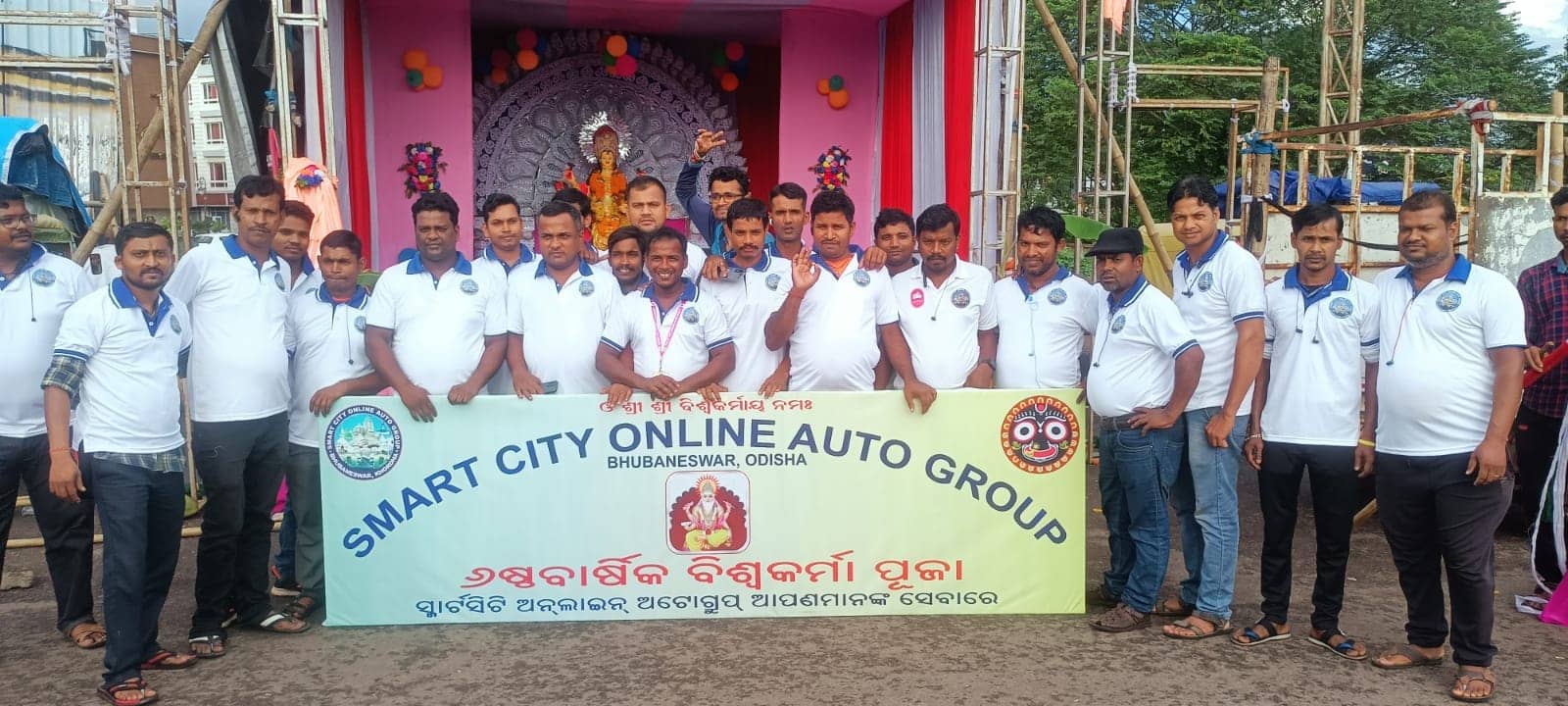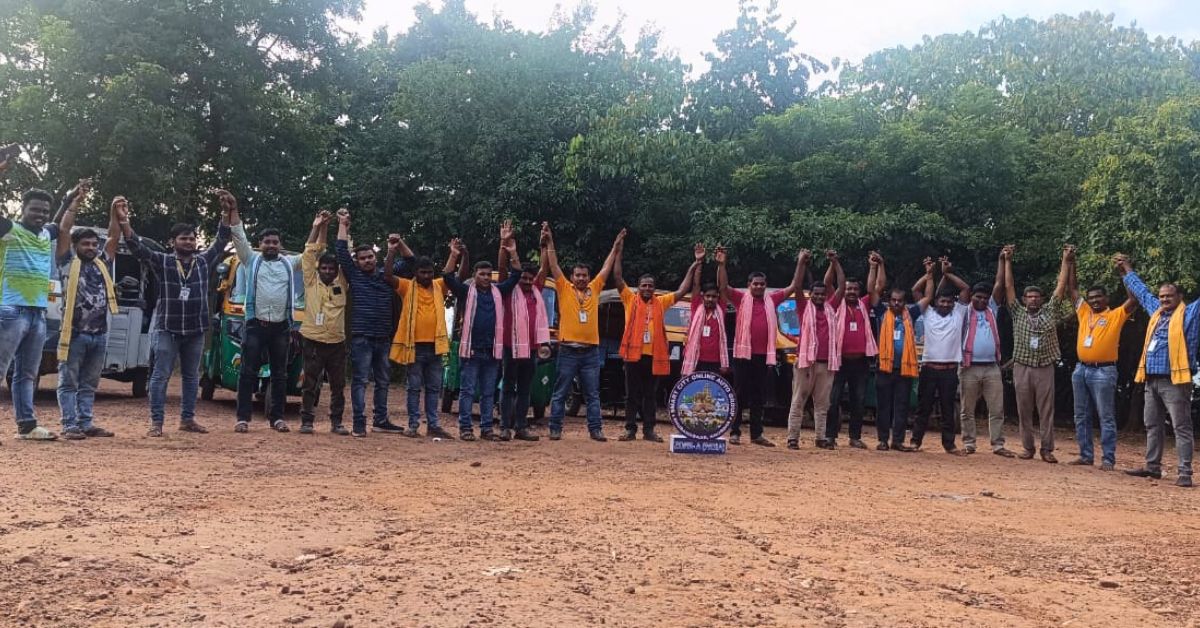In August 2014, Prime Minister Narendra Modi visited Japan, beginning with the ‘smart city’ Kyoto. There, he signed a pact to develop his constituency Varanasi as a smart city with Japan’s cooperation. This event marked the beginning of the 100 smart cities plan by the Modi government.
Following this, Dinabandhu Nayak, an auto driver in Bhubaneswar, Odisha, was inspired by this partnership and decided to launch a ‘Smart City Online Auto Association’ to alter the perception of drivers like him in the city, drawing inspiration from the Union Government’s Smart City initiative.
“Auto drivers were known for being rash, fighting, and drunken driving. I wanted to change the attitude of both drivers and commuters. For that, first I needed to counsel the drivers, for which an association was necessary,” Dinabandhu (38) tells The Better India.
Starting with 20 people in 2015, today, the association has over 10,000 members in Bhubaneswar and 50,000 all over Odisha, he informs. They registered their association in 2016, and have now divided themselves into various zones.
As the world is getting smarter, Dinabandhu wants to make sure auto drivers join the bandwagon.
Revolutionising the perception of auto drivers

Dinabandhu returned to his home in Bhubaneswar in 2015 after a stint in Hyderabad. After a few failed businesses, he decided to start driving an auto, considering it a “foolproof investment”. Meanwhile, the arrival of ride-hailing apps like Ola, Uber and Rapido in Odisha’s capital resulted in significant financial losses for drivers who didn’t transition to these platforms.
Observing a rise in conflicts, incidents of drunken driving, and overall dissatisfaction among drivers, he wanted to rectify the situation and change the public perception of drivers.
“The only way to change this situation that occurred to me was by forming an association. Even the Police had a bad impression about us as they were regularly called in during fights at the auto stands, as well as those with customers,” shares Dinabandhu who is the chairman of Smart City Online Auto Association.
The 360-degree image shift of drivers began with a noble deed — blood donation. He donated blood and shared it on their WhatsApp group. Inspired by him, others too started donating blood. He says that each of their actions inspired 10 others, and since the inception, at least 100 drivers donate blood per month in the city, amounting to almost 10,000 blood donations so far. Even during COVID, 1,000 drivers donated blood, according to Dinabandhu.
After blood donation, the drivers started ferrying accident victims through their autos. Today, the autos serve as ambulances.
“When an accident happens, we don’t wait for an ambulance or the Police to arrive. We rush the injured to the nearest hospital. This way, we have reduced the need for ambulances. We are available for any medical emergency, free of cost,” he says adding that they ferry people with disability free of cost.
He further informs that any lost items in the auto are returned to the police station or the customer directly. Arijit Chatterjee, who left his belongings in an auto, managed to retrieve them the following morning, even though he did not have the driver’s or the auto’s license plate number as he hailed the auto in person.
“I had seen the ‘Smart City Auto Association’ mentioned on the auto when I got off. So when I realised I had left my cards in the auto, I came across another auto with the same logo and told its driver what happened. He immediately informed the leader of their group who broadcasted the message in their circle. The auto driver who had ferried me called me within a few hours and handed over the valuables at my office the next morning,” says Arijit.
Auto drivers turned social workers

Dinabandhu remembers the initial days when no one was willing to join hands with him. Eventually, 20 drivers agreed.
“The frame of mind of the drivers then was very different. They couldn’t think of any benefit in joining me. They thought that they were doing just fine. More than 70 percent of the people I approached said no to me,” he says. Slowly, as drivers started seeing the changes implemented by the small group, they turned around.
Dinabandhu emphasises that he focused on enhancing driver safety, curbing the exploitative practices of the ‘mafia’ that demanded exorbitant fees from drivers for parking at stands, and consequently, he gained respect for the drivers within the city.
“Our association’s system is different. We don’t extort money to park in stands. We ensure that there is no fighting and that no one lifts a finger among us,” he says adding that more and more drivers came around when they saw that he was indeed changing the status quo.
Venkat Senapathy, one of the founding members of the association, says that the majority of their problems were solved thanks to Dinabandhu’s initiative. “One of the major problems was parking at the auto stand. We faced many difficulties with the Police too. Dinabandhu’s initiative took care of these issues. And now we have access to many facilities and feel good to be part of this,” he says.
Besides social initiatives, Dinabandhu focused on bringing about behavioural change among auto drivers. To achieve this, the drivers were counselled and educated against bad conduct.
“I spoke to the drivers and told them not to drink and drive. If we find anyone driving drunk, we remove them from our association. The act of returning lost items to customers has also improved our image among the Police, who earlier, used to be frustrated with the drivers. Now, they listen to us and even call us for any emergency,” says Dinabandhu with pride.
He is glad that the public opinion has changed from negative to positive. The drivers provide their numbers at hospitals and blood banks, and also collect surplus food from weddings and other big events to distribute among the needy.
Even when the pandemic struck the state, the auto drivers stepped up to serve people. “We ferried people for free, took patients to hospitals, and also carried oxygen cylinders. We pooled in for the medical treatment of drivers who fell sick. Unfortunately, we weren’t considered COVID warriors and the Government didn’t help us,” shares Dinabandhu.
He informs that the driver group assisted their peers, covering medical expenses and immediate necessities for the families of drivers who lost their lives because of COVID.
Another driver Deepak Sethi says that they feel satisfied at the end of the day because they get a chance to help others. He adds that people see them in a different light today, and that makes him happy.
“Today we are not seen as only drivers but as social workers as well,” remarks Dinabandhu.
Edited by Pranita Bhat
No comments:
Post a Comment